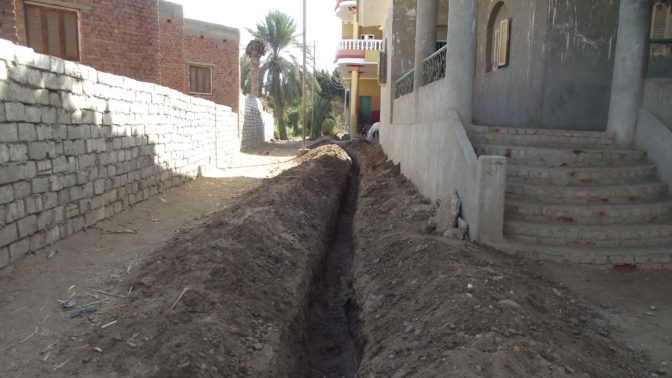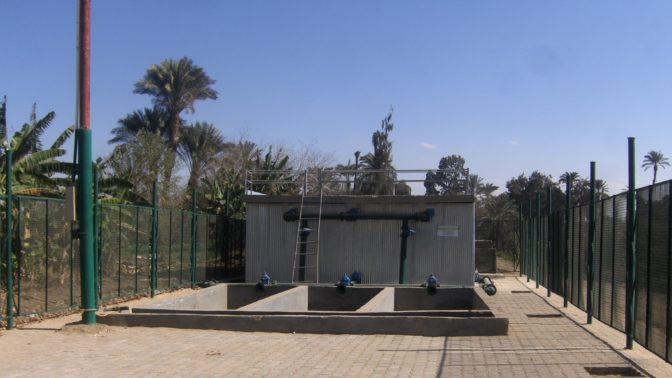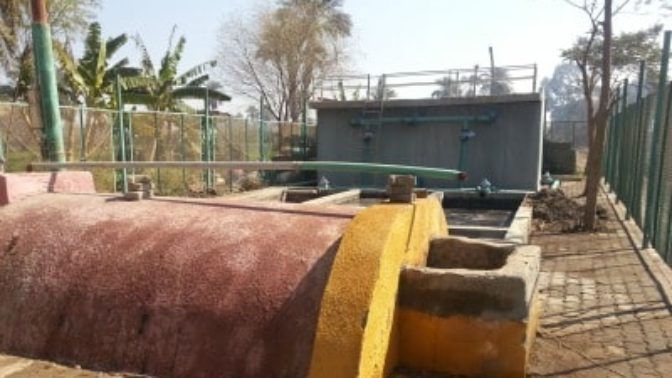Simple Wastewater Treatment Technology for Egypt Villages
Our model wastewater treatment facility is simple and consists of a low-cost network design, construction, operation, and maintenance, and is a model for rural Egyptian communities, promoting public health and the environment.
Key Facts
- The first treatment plant was planned in 2010 and now is working very efficiently.
- Since its first system, TADE has implemented 150 sanitation systems in Egyptian villages.
- In many cases, only TADE’s affordable technology will enable rural villages to install a water sanitation system.
- TADE’s wastewater technology is substantially less expensive than government systems.
- TADE’s solution has used new technology to construct wetlands with horizontal subsurface flow.
Key Features
Our organization, Together Association for Development and Environment (TADE), intended to provide rural Egyptian villages with affordable, low-tech water sanitation systems that can be sourced and built locally. Water sanitation systems are of major importance in Egypt as most wastewater in rural areas currently is not treated, polluting groundwater, causing health problems, and contaminating food/crops. The technology of TADE’s sanitation system is proven and has already been implemented successfully in one Egyptian village.
Its main advantages:
- simple technology resulting in high reliability
- a lower investment is needed
- the usage cost compared to existing conventional systems
- possibility to source all components locally and employ locals, such as unemployed youth
TADE has also developed and modified models for stables and barns to treat domestic waste, animal dung, and agricultural waste. In conjunction with this project, farmers were taught how to treat the sludge by composting it with agriculture. The output of the treatment plant can be used as an organic fertilizer after being mixed with agricultural waste and stored for one month. The number of stables implementing the model increased from 3 to 500 in the village where TADE undertook its pilot project. The sludge produced by our wastewater treatment plants is safe to use as a fertilizer after composting, as there are no heavy metals in the product.
Simple Wastewater Treatment Technology for Egypt villages will improve the lives of users by improving public health in the local community, mainly because of the availability of better sanitation and a safer water supply.
Social Impact
About 50% of Egypt’s rural population (47 million people) do not have access to improved sewage systems. For most people in this group, the conventional water sanitation solution offered by the government is too expensive (about a $4.5 million investment for a village of 10,000 people) compared to TADE’s water sanitation system ($200,000 investment).
Furthermore, the user fees of the governmental system are about 10 times higher than those of TADE’s system ($10 vs. $1 for villages of 10,000 inhabitants). Market entry is planned to occur in several steps.
- After the successful completion of a pilot project with one village, five villages will receive the new water sanitation system.
- Detailed planning is already available for these five villages.
TADE offers the following social benefits based on an investment in the company:
- Improved public health in the local community, mainly because of the availability of better sanitation and a safer water supply.
- Lower costs for communities compared to government-proposed sewage systems that often call for massive investments, thus increasing the likelihood that a community will be able to develop a system that meets its inhabitants’ needs.
- Unemployed village youth or other members of the community are trained to construct and provide maintenance services for these systems, therefore generating local employment.
- The increased availability of basic infrastructure reduces the pressure to migrate to urban centres for inhabitants of rural areas, especially its younger population.
- Further benefits include the ability to produce organic fertilizer and water suitable for irrigation purposes.
Future Plans
We will implement this project again to cover 3 different villages in 2023.
Main Target Group
Potential direct customers of TADE are individual households in villages and small towns in rural regions of the country. Egypt is home to approximately 83 million people, 57 percent of which (47 million) live in rural areas. About 10.8 million people in rural areas live in poverty and, while 98 percent have access to an improved source of water, only 52 percent have access to improved sanitation facilities. According to the United Nations’ International Fund for Agricultural Development, most of the rural population live in Upper Egypt (where Minia Governorate is located), where there is an increased poverty rate and poorer access to safe water and sanitation compared to the national average.
Main User
Rural residents and CDAs (Community Development Association)
Price (in USD)
$200,000


